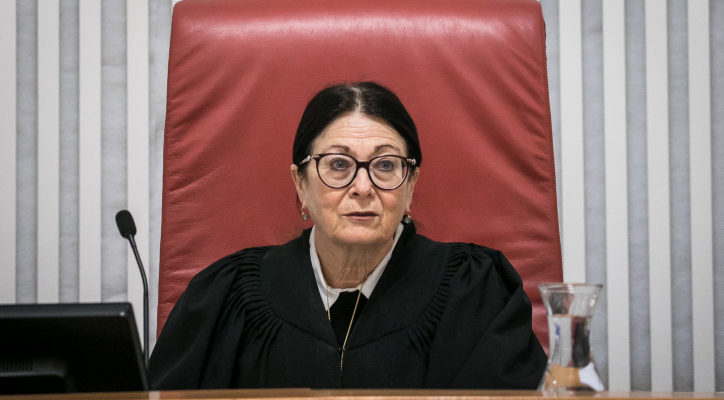Israel’s Sephardi Chief Rabbi Yitzhak Yosef called the decision “extremely regrettable.”
By Lauren Marcus, World Israel News
In a landmark decision, the Israeli Supreme Court ruled Monday that people who convert to Judaism under the auspices of the Reform and Conservative movements in Israel, contrary to the requirements of Jewish law, are entitled to Israeli citizenship.
According to the 1950 Law of Return — widely considered one of the founding principles of the state — only people with Jewish heritage or married to someone with Jewish heritage can obtain Israeli citizenship.
The petition to grant citizenship to those who converted through non-Orthodox movements in Israel was originally filed in 2005. After 15 years of requests to delay a hearing on the matter by the Israeli government, the Supreme Court ruled that the issue could not be pushed back any longer.
“We refrained from issuing a ruling in order to allow the state to advance legislation on the issue,” Judge Dafna Barak-Erez wrote.
Due to the fact that no legislation on the matter had been put forward in over a decade, the Court decided to rule.
The ruling was made by an 8-1 verdict, with only Judge Noam Sohlberg dissenting.
Sohlberg said he believed the Supreme Court should delay the decision by 12 months, until a new government is sworn-in.
After the Law of Return was expanded in 1970, people who converted to Judaism abroad, including through the Reform or Conservative movements, have been eligible to make Aliyah.
The significance of Monday’s decision is that it enables people who are not Israeli citizens and do not meet the above criteria but are already present in Israel to complete Reform or Conservative conversions and gain citizenship.
While the petitioners argued that granting citizenship to Reform and Conservative converts is critical to protect people whose lives are based in Israel — for example, the foreign spouses of Israeli Jews who are at risk of losing their residency when their partners die — the decision leaves a massive legal gray area.
Theoretically, African migrants and foreign workers who live in Israel without legal status could now complete Reform or Conservative conversions and subsequently receive Israeli citizenship.
Reform and Conservative conversions are performed contrary to Jewish law and are not accepted by any streams of Orthodox Jewry.
Netanyahu’s Likud party said in a statement: “The High Court made a decision that endangers the Law of Return, which is a cornerstone of Israel as a Jewish and democratic state.”
As expected, left-wing leaders celebrated the decision as a victory for freedom of religion in Israel, long a contentious issue in the state.
“Israel must have complete equality of rights for all streams of Judaism – Orthodox, Reform or Conservative,” said Yair Lapid of Yesh Atid, known for his anti-religious views and contempt for ultra-Orthodox Jews.
In reality, the decision is primarily bureaucratic. The ruling does not affect the Rabbinate, the Orthodox institution that presides over all Jewish matters in the state, including Kosher certifications and marriage between Jews.
Israeli Jews must go through the Rabbinate to legally marry and divorce, and the institution decides who is entitled to be buried in a Jewish cemetery.
While Reform and Conservative converts can now apply for Israeli citizenship, it is highly unlikely that they will be recognized by the Rabbinate as Jews for lifecycle events such as marriage.
Israel’s Sephardi Chief Rabbi Yitzhak Yosef called the decision “extremely regrettable.”
“What the Reform and Conservative [movements] term ‘conversion’ is nothing but a falsification of Judaism and will mean including thousands of Gentiles among the people of Israel,” he said in a statement.
Ashkenazi Chief Rabbi David Lau added, “Those who converted through Reform conversions and the like are not Jewish. No Supreme Court decision will change that fact.”
The decision also raises questions about judicial activism in Israel. In April 2020, a bill passed by the Knesset banning leavened wheat (chametz) products in hospitals during the Passover holiday was overturned by the Supreme Court.
“The judges are extremely insolent,” said MK Moshe Gafni (United Torah Judaism) at the time.
“What we legislators do with countless discussions and four plenum readings, they cancel with a single decision that lacks all logic, ruling according to their worldview without regard for anything else. We should end this.”





